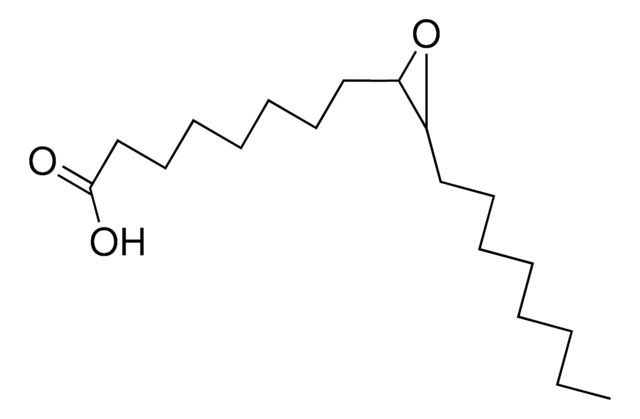E5641
11,12-Epoxy-(5Z,8Z,14Z)-eicosatrienoic acid
~100 μg/mL in ethanol, ≥95%
Synonym(s):
(±)11,12-EpETrE, 11,12-EET
About This Item
Recommended Products
Quality Level
Assay
≥95%
concentration
~100 μg/mL in ethanol
lipid type
omega FAs
storage temp.
−20°C
SMILES string
CCCCC\C=C\CC1OC1C\C=C\C\C=C\CCCC(O)=O
InChI
1S/C20H32O3/c1-2-3-4-5-9-12-15-18-19(23-18)16-13-10-7-6-8-11-14-17-20(21)22/h6,8-10,12-13,18-19H,2-5,7,11,14-17H2,1H3,(H,21,22)/b8-6+,12-9+,13-10+
InChI key
DXOYQVHGIODESM-ATELOPIESA-N
Packaging
Signal Word
Danger
Hazard Statements
Precautionary Statements
Hazard Classifications
Eye Irrit. 2 - Flam. Liq. 2
Storage Class Code
3 - Flammable liquids
WGK
WGK 1
Flash Point(F)
48.2 °F - closed cup
Flash Point(C)
9 °C - closed cup
Certificates of Analysis (COA)
Search for Certificates of Analysis (COA) by entering the products Lot/Batch Number. Lot and Batch Numbers can be found on a product’s label following the words ‘Lot’ or ‘Batch’.
Already Own This Product?
Find documentation for the products that you have recently purchased in the Document Library.
Our team of scientists has experience in all areas of research including Life Science, Material Science, Chemical Synthesis, Chromatography, Analytical and many others.
Contact Technical Service







